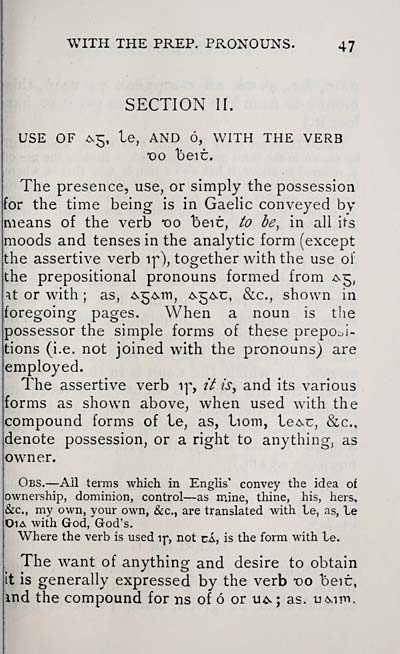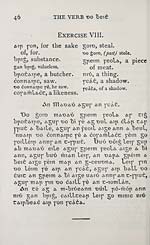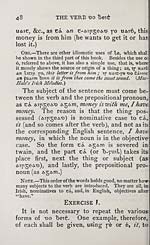Download files
Complete book:
Individual page:
Thumbnail gallery: Grid view | List view

WITH THE PREP. PRONOUNS. 47
SECTION II.
USE OF A5, te, AND Ó, WITH THE VERB
00 beic.
The presence, use, or simply the possession
for the time being is in Gaelic conveyed by
means of the verb ^0 li>eic, to be, in all its
moods and tenses in the analytic form (except
the assertive verb if ), together with the use of
the prepositional pronouns formed from ^5,
t or with ; as, ^&m, &5AX, &c, shown in
foregoing pages. When a noun is the
possessor the simple forms of these preposi-
tions (i.e. not joined with the pronouns) are
employed.
The assertive verb if, it is, and its various
forms as shown above, when used with the
compound forms of te, as, bom, te&u, &c,
denote possession, or a right to anything, as
owner.
Obs. — Ail terms which in Englis' convey the idea of
ownership, dominion, control — as mine, thine, his, hers,
&c, my own, your own, &c, are translated with Le, as, te
Oia with God, God's.
Where the verb is used if, not cÁ, is the form with Le.
The want of anything and desire to obtain
it is generally expressed by the verb r>o beiu,
md the compound for ns of ó or u^; as. uMm.
SECTION II.
USE OF A5, te, AND Ó, WITH THE VERB
00 beic.
The presence, use, or simply the possession
for the time being is in Gaelic conveyed by
means of the verb ^0 li>eic, to be, in all its
moods and tenses in the analytic form (except
the assertive verb if ), together with the use of
the prepositional pronouns formed from ^5,
t or with ; as, ^&m, &5AX, &c, shown in
foregoing pages. When a noun is the
possessor the simple forms of these preposi-
tions (i.e. not joined with the pronouns) are
employed.
The assertive verb if, it is, and its various
forms as shown above, when used with the
compound forms of te, as, bom, te&u, &c,
denote possession, or a right to anything, as
owner.
Obs. — Ail terms which in Englis' convey the idea of
ownership, dominion, control — as mine, thine, his, hers,
&c, my own, your own, &c, are translated with Le, as, te
Oia with God, God's.
Where the verb is used if, not cÁ, is the form with Le.
The want of anything and desire to obtain
it is generally expressed by the verb r>o beiu,
md the compound for ns of ó or u^; as. uMm.
Set display mode to: Large image | Transcription
Images and transcriptions on this page, including medium image downloads, may be used under the Creative Commons Attribution 4.0 International Licence unless otherwise stated. ![]()
| Early Gaelic Book Collections > Blair Collection > Treas leabhar Gaedhilge > (53) |
|---|
| Permanent URL | https://digital.nls.uk/82322022 |
|---|
| Description | A selection of books from a collection of more than 500 titles, mostly on religious and literary topics. Also includes some material dealing with other Celtic languages and societies. Collection created towards the end of the 19th century by Lady Evelyn Stewart Murray. |
|---|
| Description | Selected items from five 'Special and Named Printed Collections'. Includes books in Gaelic and other Celtic languages, works about the Gaels, their languages, literature, culture and history. |
|---|

